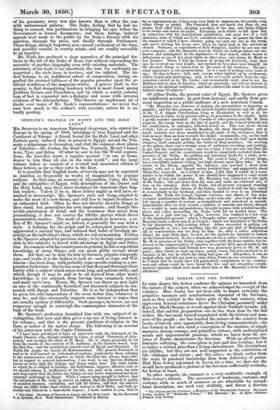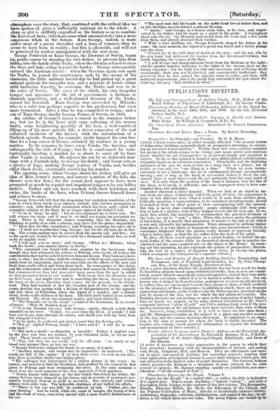THE FOREST AND THE FORTRESS. *
Ix some degree this fiction confirms the opinion we hazarded, from the nature of the subject, when we acknowl
the receipt of the volumes. Miss Jewry has not been able teodePict naturally the- primitive manners and semibarbarian character of the Servians,. such as they existed in the latter part of the last century, when oppression beyond endurance drove the Christian peasantry under Kara (or Black) George to revolt against their Turkish tyrants. All, indeed, that careful preparation can do has been done by the fair writer. She has made herself acquainted with the history and man- ners of the people ; she has learned the nature of the country from books of travels, and, apparently, from living communications ; she has formed in her own mind a conception of the mixture of simple manners, daring courage, and primitive virtues, with undisciplined minds and ungovernable passions, which we knew from the pic- tures of Ranke characterize the Servians. With an allowance for feminine softening, the conception is just and true-looking; but it is xather a critical plan than a living embodiment. The descriptions are lifelike, but they are not well supported in the exhibitions of life—dialogue and action ; and this arises, we think, rather from the want of practical knowledge than front deficiency of power. Had Miss Jewry sojourned in Servia for a time, we dare say she would have produced a picture of the Servians sufficiently accurate,. for fiction at least.
In other respects, the romance is a very creditable example of Miss Jewry's talents. The accessories of landscape, costume, and customs, with so much of manners as are attainable by second- hand description, are used very skilfully, and throw a Servian
• The Forest and the Fortress ; a Romance of the Nineteenth Century. By Laura Jewry, Author of " Kirkham Priory," " The Ransom," &c. In three volumes.
Publish d by Newby.
atmosphere over the story, that, eombined with the critical idea we have spoken of, gives a sufficiently national air to the whole. A story or plot is skilfully engrafted on the history so as to combine the historical facts, (which are somewhat unconnected,) into a more congruous whole in the fiction. Kara George, indeed, is made rather more of a preux chevalier and a hero of romance than he seems to have been in reality ; but this is allowable, and will not be ppeerrceeeived by readers unacquainted with his real story. Georrggee Petrovich or Kara er:wrge, the liberator.of Servia, began his public career by shooting his own father, to prevent him from falling into the hands of the Turks, when the old man refused to cross the Save and take refuge beyond the border. George subsequently entered the Austrian service : when the Servians again rose upon the Turks, he joined his countrymen, and, by the energy of his character, the little military knowledge he had picked up, a great natural aptitude for irregular war, and a mixture of heroic virtue with barbarian ferocity, he overcame the Turks and rose to be the ruler of Servia. The envy of the chiefs, his own irregular temper and ignorance of the art of government, a factious or clannish opposition, and a well-planned invasion of the Turks, caused his downfall. Kara George was succeeded by Milosch ; who as a ruler was perhaps superior to his predecessor, but even more tyrannical After a time he was compelled to resign ; and a son of Kara George finally became Prince of Servia, is 1813. An outline of bGeorge's career is traced in the romance before us; but (as he is the hero) with some softening of his worser traits, some heightening possibly of his best, a well-contrived filling-up of his more private life, a clever connexion of the real collateral incidents of the history with the introduction of a Turkish episode. George, for example, justly hanged his own bro- ther for a long career of licence, crowned by violence to a young Maiden. In the romance he lures away Venda, the heroine, and subsequently the wife of George ; but he is condemned for Tulin- tontionally shooting a maiden he is about to carry of by force after Venda is rescued. He adjures his son by an unknown mar- riage with a Turkish lady, to avenge his death; and Laser acts as a species of logo, making George jealous of Panda, and, besides other black deeds, eventually contriving his murder.
The opening scene, where George shoots his father, will give an idea of Miss Jewry's power, and convey a notion of the halo she throws over her hero; for the actual deed appears to have been prompted as much by a quick and impatient temper as by any loftier motive. - Father and son have reached, with their herdsmen and swine, the benks of the Save, when Petroni throws himself down and refuses to cross.
"George Petrovich felt that the despairing but unshaken resolution of the tone in which these words were uttered, forbade alike further persuasion or entreaty; and, with that filial submission which has been aptly called the seem:Wiry religion of the East, he no longer opposed his father's will. So-he it, then,' he said ; but do hot command me to leave you. We will retrace our steps, and it may be we 41211 yet regain our mountain re- fuse.. There is the desperate chance remaining that the Bosniaks, not thn2.1eing us guilty of so rash a scheme, may have left the passes unguarded.' ,
' Bless thee for this compliance,' said Petroni, accepting his son's aid to rise: 4I shall not trouble thee long, George ; but let the old man die in Ser- via. The young sapling may be moved from the parent soil, and live ; not so the aged oak, bound to its native earth by a thousand minute ties, as well as by its mighty roots.'
" I will urge you no more,' said George. 'What ho ! Milenko, bring back the herds; your master tarries in Servia.'
"The command was heard with some surprise by the herdsmen, who, though they had witnessed the actions of Petrone were too far off to hear the conversation that had been held between him and his son. They hastened, how- ever, -to obey ; but the swine, with the obstinacy- of their species, appeared reso- lutely bent on emigration, and it was some time ere the efforts of the men and their dogs could collect and bring them back. In eonsequenee of this delay, and-the exhaustion which powerful emotion had caused in Petroni, twilight had commenced ere they had proceeded many paces from the spot in which we first presented them to our readers. Well aware that the Bosniaks were on their track, and might even now be searching the forest, George kept to the bank of the river, directing their course, for the present, to the South- west They had reached at last the broadest part of the stream, and the young Selman was gazing with a feeling of disappointment on the opposite and safe shore of Slavonia, when the report of a musket, and a distant shout, broke on the stillness of the hour. The little party halted in an instant midlistened. The shout was repeated nearer, and more distinctly. , The Osmanhs are in the wood!' exclaimed the herdsman, in an accent of terror. `Holy St. Stephen keep us! ' ." "It is the Bosniak war-cry; mid George, calmly, though a dark flush mounted on his brow. Father, we must cross the river, or perish ! I will bear you in my arms through its waters, and shield you with my bodY from the renegade's bullets.'
-"As he spoke, he gathered and girded round him his flowing robe.
," 'Not so,' replied Petroni, firmly ; I have mid it ! I will die in mine own land
"" 'But such a death ! so shameful, so horrible ! Father, I implore you, by the love you bore my mother, by your Christian faith, to let me save yqu! These woods are not the world.'
" Nay, but they are my world,' said the old man. As surely as my bread may prosper thee, go not, my son.' " George Petrovich clasped his hands in an agony of despair. "'Another minute, and escape may be impossible; he muttered. The woods are full of the enemy : if we seek their cover, we rush on our fate ; here there is neither shelter nor hiding-place.'
-" His soliloquy was interrupted by a sudden plunge in the water : he tdrned, and perceived that the herdsmen had profited by the counsel he had mem to Petroni and were swimming the river. At the same moment a shout from the wood announced the close approach of their pursuers. " Nearly frantic with horror at the fate which threatened his father, the young Semen threw himself on his knees, and in accents of passionate per- suasion implored Petroni to yield to necessity. But entreaty and remon- strance were alike vain. The inflexible obstinacy of age baffled his efforts. " There. -is but one way left,' he mattered, as last. Father, give me your blessing.' And he knelt, while the crash of boughs, the tramp of feet, and the clash of arms, came every second with a more fearful distinctness on his ear. " The wed man laid his hands on the noble head bowed before hint' and in low- thrilling accents uttered a solemn blessing. " Amen ! ' said George, in a -hoarse stern tone, as he rose, and, unper- ceived by his father, laid his hand on a pistol in his girdle. A triumphant shout rent the air : the Bosniaks had issued from the wood only a few yards from them, and alma_ dy descried their victims.
With a wild thrilling cry, George Petrovich clasped his father in his arms : the neat moment, the reportof a. pistol was heard and a heavy plunge into the river.
" Petroni lay in the still sleep of death- on the spot ; and his son, who by his own hand had delivered the warrior from his threatened tortares, was
1 breasting the waters of the Save.
" yell of rage and disappointment burst from the Moslems at the sight ; and the greater number. hurrying to the brink of the- stream, Bred on the daring swimmer : but the light was dim and iumertain, and as George dived occasionally, their aim was ill-directed, and consequently ineffectual : she perceived that he had gained the opposite shore in safety, and then, wit muttered imprecations, joined the group that surrounded the spot where Pe- - troni lay, his gray hair dabbled in blood.' "



























 Previous page
Previous page